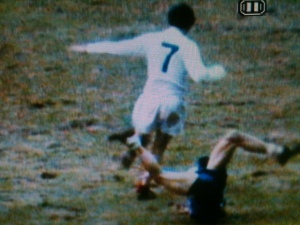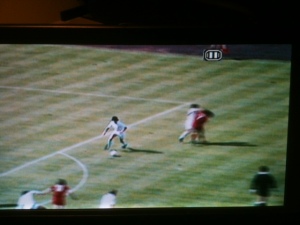
SOCCER IN BRITAIN IN 1970s
In the 1971-2 season Brian Clough took the former Second Division Derby County side to the top of the First Division (now the Premier League). The following season the new champions came up against the former champions Leeds United. The two sides had met before, in an FA Cup tie, but here they were facing each other as division equals. Sort of. This league game took place a few days before Derby County’s European Cup semi-final against Juventus.
In Tom Hooper’s film The Damned United the Derby County v Leeds United game resembles a medieval pitched battle fought in a ploughed field during a torrential downpour. There are bone crunching body checks, ankle-scything tackles from behind, there is blood, there are blatant head butts, kidney punches, left hooks, and the stomping on of downed players. The actor playing Leeds United captain Billy Bremner then sarcastically wishes the actor playing Derby County manager Brian Clough “good luck in Europe”. The film infers, none too subtly, that Derby County lost 3-1 to Juventus because their team had been sorely depleted by injury.

In reality, Derby County did indeed lose to Juventus in controversial circumstances, with claims from Brian Clough that the Italian club had bribed the match officials, calling them “cheating bastards”.
Football in 1970’s Britain was a reflection of the society in which it was played. Britain back then seemed to be a black-and-white place where it never stopped raining. It was a land of power cuts, spiraling inflation and massive unemployment. The peace and love generation’s flower children had withered, their petals crushed between the gigantic pages of merciless history books. It was every man for himself, and win at all costs in recession-stricken Britain. If Brazil’s soccer reflected carnival and dancing in the streets, English soccer reflected a hooligan rampage through a burning shopping center.
How would the pampered superstars of today, with their snoods and gloves, their manicured lawn playing surfaces, and perfect hi-tech balls, have survived the blood and mud baths of the English First Division of 1971? Well a lot of them probably wouldn’t. Not even with their own personal, hospital-sized injury treatment teams.

“I think the game was shall we say more physical then. Y’know players got away with a lot more then. The referees were more lenient, the game was probably tougher.”
-Eddie Gray (Leeds United and Scotland)
In 1973 tackling from behind was perfectly legal. The referees were seemingly oblivious to a lot that happened off the ball anyway, and players took full advantage. There is archive footage of kidney punches, clear and blatant right hook punches to the head, nose breaking headbutts, tackles that include forearm smashes to the mouth. It was apparently common knowledge among players that Manchester City striker Rodney Marsh had a trick of running into the area with the ball and if a defender came anywhere near him he’d clip his own heel and go flying, demanding and often getting a penalty. No slander this, watch the special features interviews on The Damned United DVD with former Leeds United players Eddie Gray and Gordon McQueen. They smile fondly as they recall the “bending of the rules”.

“There’d be four or five sendings-off (in the league) every week, there’s absolutely no doubt about that. They’ve clamped down a lot now. The tackle from behind for example that was legal in the days we played so that pretty much let you get away with anything. There wasn’t cameras covering absolutely every angle so you could get away with things off the ball. So there was quite a lot going on and referees then compared to now well there’s an absolutely massive difference.”
-Gordon McQueen (Leeds United, Manchester United, Scotland)
When Brian Clough came to Leeds United as their new manager in 1974 he lasted precisely 44 days before being sacked. The players, conditioned by 15 years of being coached to not only play but apparently to cheat and cheat well by former manager and father figure Don Revie, refused to play for Brian Clough. They had Leeds worst start to a season for 20 years. Brian Clough in typical bluff manner had told the players to go home and take all their medals and cups and awards and throw them in the trash. He told them they’d been won by cheating, they had won “ugly”. He told them they were going to play different soccer from now on, they were going to win by playing fair. They were going to play with smiles on their faces. He told them people were going to love them for playing decent, honest, attractive football. And in a perfect reflection of British society at the time they told him to “f*ck off!”
“Johnny Giles and Norman Hunter were two players who were fiercely competitive, I mean fiercely competitive, and Billy Bremner. They didn’t want to lose football matches and sometimes they would bend the rule books to say the least.”
-Gordon McQueen

After he left Leeds, Don Revie’s subsequent career as England national team manager failed, and he disappeared into Middle Eastern soccer where allegations of corruption and bribery swallowed him.
Brian Clough took another Second Division side, Nottingham Forest, up to the First Division and on to win the European Cup in 1979 and retain it again in 1980. To this day, he is the only English club manager to achieve this. Brian Clough made enemies by speaking the truth but the truth he spoke was that fair play is the best way to win. A truth we would all do well to bear in mind. Whatever year it is.
LUKE JAMES SOCCER
IN THE VALLEY OF THE SOCCER GODS
